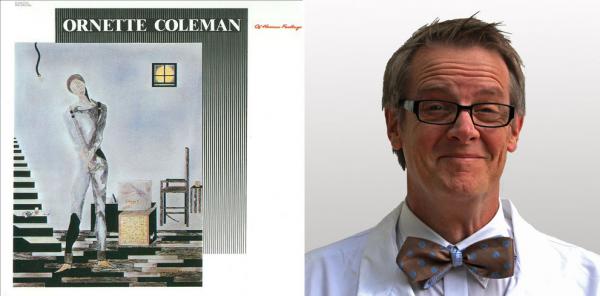Brent Butterworth on "Jump Street" by Ornette Coleman

We describe famous musicians as "brilliant" or "innovative" or "creative," but mostly, they aren't. They're just making minor modifications to a harmonic, melodic, and rhythmic framework borrowed from musicians who preceded them-and those earlier musicians did the same thing, too. And so on and so on.
I can think of only a few pieces of music that to me sound like something truly creative, something that can't be traced back to obvious influences, something built from scratch rather than based on existing plans. And of them all, my favorite is jazz saxophonist Ornette Coleman's obscure 1982 album Of Human Feelings-and in particular the second track, "Jump Street."
I remember the first time I heard Of Human Feelings, having bought a vinyl copy after reading a five-star review in Musician magazine. From the first few notes, it reminded me of the times around 1970 when my brother and I and our neighborhood buddies-all of us in 1st, 2nd, or 3rd grade-would get together with a ukulele, a couple of toy drums, and a plastic slide whistle caught at a Mardi Gras parade and try to emulate our favorite tunes on the jukebox at the nearby swim club: "Living Loving Maid," "Daughter of Darkness," "Ride Captain Ride," and others. Of course, what emerged was more cacophony than music. But not having the slightest idea what we were doing, we were able to play with a gusto and freedom that professional musicians can rarely muster.
"Jump Street" has that same feeling of not knowing what you're doing or where you're going but storming headlong into it anyway. That's not to say it's unstructured, as much of Coleman's music is. To me, Coleman's work often sounds like meandering blues licks accompanied by a great rhythm section. When he formed his electric band Prime Time in the late 1970s, Coleman finally found the element that gave his music structure without stricture: electric bassist Jamaaladeen Tacuma. By Of Human Feelings, Prime Time's third release, Tacuma's mathematical improvisations were fully in sync with the gurgling rock rhythms of guitarist Charlie Ellerbee and the clattering funk of drummers Denardo Coleman and Calvin Weston, giving Coleman and jazz guitarist Bern Nix the freedom to soar into the stratosphere without flying off into outer space.
(Side note #1: Here's how distinctive Tacuma's sound is. On New Year's Eve 1988, I was at the Knitting Factory in New York-the old location on Houston St.-waiting for guitarist James "Blood" Ulmer and his band to start. I was deep in an argument with a girlfriend who, despite my repeated warnings that the Knit was a dump, anticipated a Rainbow Room-style extravaganza complete with caviar and champagne. With my back turned and her raised voice and the din of the crowd ringing in my ears, I didn't notice the musicians had taken the stage. The bassist plucked two notes to make sure his bass was working, and from just those two notes, I yelled, "Oh my god, it's Jamaaladeen!" I turned my head and saw I was right. From a social standpoint it was my worst New Year's ever, but musically, it was the best.)
Like most tunes performed by jazz artists, "Jump Street" relies on a head-solos-head structure, where the band starts with the melody, then improvises for a while, and ends by repeating the melody. But the tune itself, like everything else on Of Human Feelings, has a radical structure that resembles nothing else I've heard. It sounds almost like four different tunes being played simultaneously that just happen to lock in together.
The miracle comes in the middle, as the musicians improvise independently yet somehow achieve synchronicity. They inspire each other to clever twists of rhythm and turns of melody without obviously supporting each other. It's more disparate than Dixieland, yet more disciplined than the "four guys playing random crap" concept that any frequent visitor to Manhattan's "downtown" music clubs will eventually encounter. On no other recording I've heard does Coleman sound as focused-yet fearless, and perhaps even reckless-as he does here. Although Coleman's attempts to explain his "harmolodic" concept are as confusing as particle physics, it seems to me that Of Human Feelings is the one recording where his stated intentions match the result.
It's worth noting that the performance was captured live in the studio in 1979, recorded in one day on a then-rare Sony PCM-1600 two-track digital recorder. That means no overdubs, no multitracking, no remixing, and few, if any, fixes or added effects.
(Side note #2: In the waning days of our marriage, my increasingly contentious ex-wife provided a completely different yet equally valid take on "Jump Street." I'd clipped a 20-second snippet of the melody in which Coleman leaps up an octave, from a croon to a squeal. I then applied heavy dynamic compression and loaded it onto my cell phone as a ring tone. "You just have that on there to annoy people!" she insisted when my phone rang in the middle of a spat. She apologized after I explained that it was one of my favorite pieces of music, that I'd seen the band perform it on stage not long after the album was released, and that the bassist on the recording was the guy who originally inspired me to start wearing bowties. But on some level, she was probably right.)
Coleman fans largely ignore Of Human Feelings. I've never seen a critic list it among Coleman's essential releases, and while his recordings of the late 1950s and early 1960s have never gone out of print, Of Human Feelings long ago vanished from the racks of record stores. So why is it overlooked? My guess is because it uses electric bass, distorted guitar, and rock/funk drummers, and thus doesn't conform to the cornpone romantic image of jazz to which so many of the music's fans cling.
To my ears, Of Human Feelings was not only the first album in which Prime Time gelled perfecly with Coleman, but also the last. Later efforts returned to the languid sound that characterized Coleman's earlier work, reaching their nadir with Virgin Beauty, a collaboration with perhaps the one man who could outnoodle Coleman: Jerry Garcia.
I just listened to "Jump Street" and the other tracks on Of Human Feelings again while I was writing this. Even after hearing this album hundreds or thousands of times over 31 years, I still can't believe a group of musicians could work together-or not work together-to achieve such a singular result. And I can't think of another work of art that so inspires me to cast aside convention and dare to do my own thing.
- Log in or register to post comments




















































